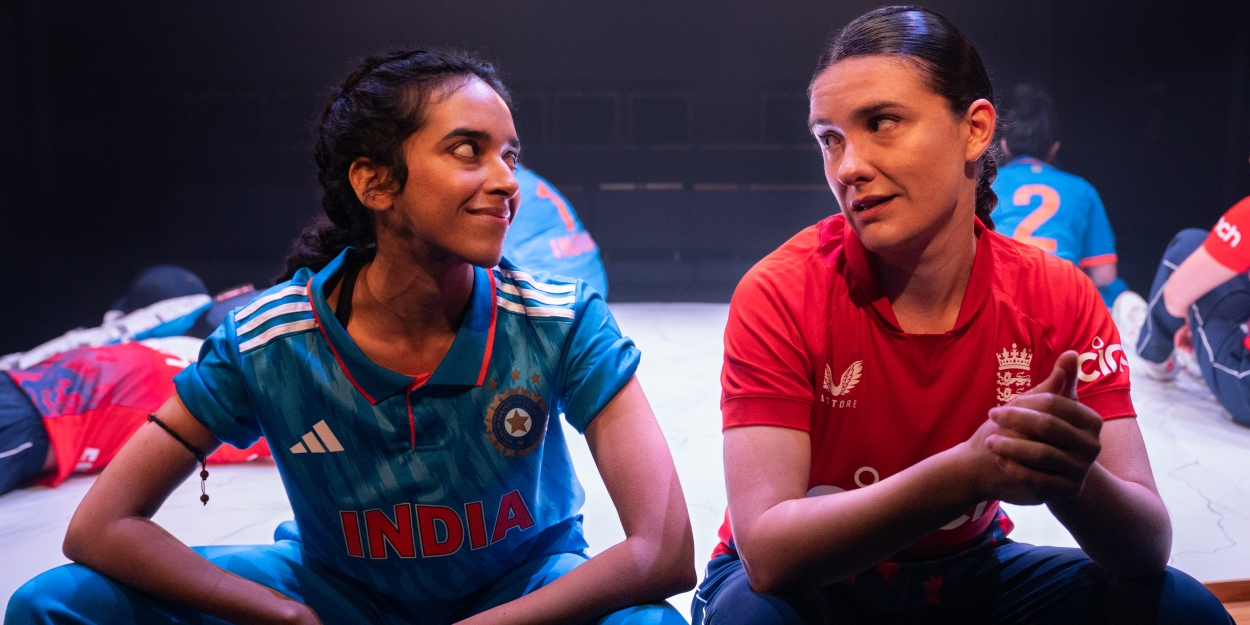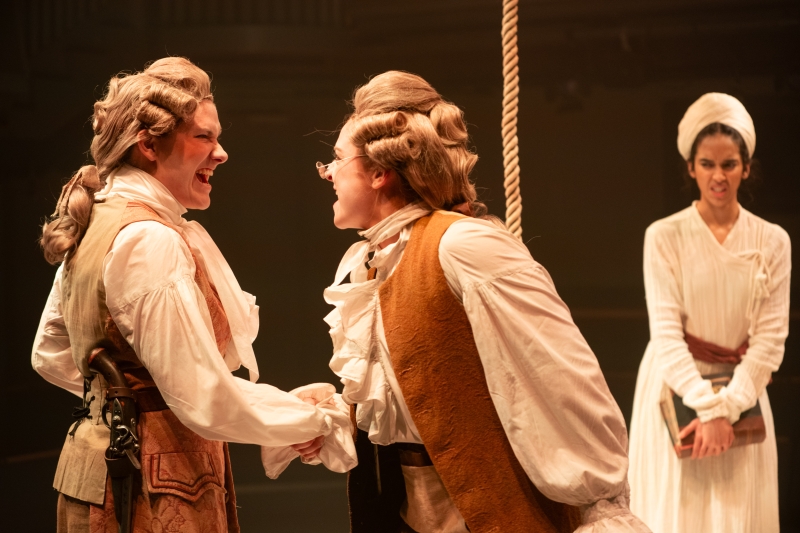Review: TESTMATCH, Orange Tree Theatre
Kate Attwell’s play makes its UK debut in Richmond ahead of a run at the Octagon Theatre in Bolton

![]() “This way, you win, no matter what.” The Women’s Cricket World Cup Final in the present day, and eighteenth century Calcutta – on the face of it there’s the barest of connections, but when you drill down a bit deeper you can see how the relationship between England and India was first forged. Or, perhaps more accurately, forced.
“This way, you win, no matter what.” The Women’s Cricket World Cup Final in the present day, and eighteenth century Calcutta – on the face of it there’s the barest of connections, but when you drill down a bit deeper you can see how the relationship between England and India was first forged. Or, perhaps more accurately, forced.
Kate Attwell’s play sees a selection of the England and India women’s teams chewing the fat during a rain break; inevitably the weather starts off as the main topic of conversation, followed by a discussion of cultural differences – but it’s not long before tempers start to fray. It’s clear something is bothering the England captain, although she refuses to talk about it, the truth has a way of coming out. After the interval we are transported back to the early days of the East India Company’s cricket team, as the men get together to ensure that female players are denied credit for their contribution to the game – and also to make their rules the only rules.
Despite the constant cries of “Keep politics out of sport!”, the colonialist link between England, India and their cricket teams is still alive and well in the more sensationalist and extreme areas of the cricket press and fandom, where even the slightest bit of criticism of India by an English voice is drawn back to this. There’s no foundation in this, of course, but given what the British Empire inflicted upon India, it’s understandable that the after-effects are still felt generations down the line.
What’s interesting now is that India’s governing body now calls most of the shots in the world game, rather than there being a more equal share of power across the top cricketing nations; one thing that Testmatch makes clear is the catastrophic consequences of an imbalance of power, both in terms of the integrity of a sport and when you consider the human cost.

Attwell was inspired to write this play after watching a women’s Twenty20 match and seeing how “fierce and powerful” the players looked; using female players as a starting point allows her to right some wrongs – as I’m sure many audience members will have been unaware that the sport started out as much more of an equal endeavour between men and women, and also that the recognisable bowling action stems from female players trying to avoid their skirts. It’s worth noting that you don’t need an encyclopaedic knowledge of cricket in order to watch this play, just an interest in the wide-ranging effects of empire and the sexism embedded into multiple aspects of everyday life.
Certainly, for die-hard cricket fans it’s like entering a parallel universe: one of the early declarations is that Australia are fielding their weakest side in years and aren’t a team to be feared. (In reality this couldn’t be further from the truth.) It’s also rather unusual to find a group of players from opposing sides in this situation – particularly during such a high-status match. It is a mental adjustment to make, but the world that Attwell has created is incredibly tangible, and fits the bill as far as storytelling goes.
The ideas at the heart of the play are good, however there are areas that feel like they need a bit more development – mostly in the first act, as it does start to feel like they’re going round in circles at times. Given that the tone is quite confrontational for the most part, it is quite a lot to take in. The second act, by contrast, feels a lot more thought-through, and definitely helps to tie up some of the loose ends from act one. What still remains unclear is the need for an extended monologue about the virtues of “rugby boys” over “cricket boys”, as well as the Memsahib’s opium-induced hysteria – in its current state these strands are quite jarring and feel a bit out of place.
Usually I’m not keen on intervals in plays with such short running times, however in this case it is absolutely necessary – partly for a complete costume change, but also to allow the seeds planted in the first act to take root. There is plenty to think about, even in the play’s current form.
The cast of six put in strong performances, and are convincing in both their roles as female cricketers and members of colonial Indian society. Aarushi Riya Ganju is particularly affecting in her role as the messenger, her powerful delivery really hammers home the devastation the East India Company have left in their wake. Haylie Jones and Tanya Katyal provide some light relief in both acts, with their excellent comic timing and the former’s catchphrase of “Cup of tea?” at various points in the play. Bea Svistunenko is excellent in her two contrasting roles of tortured England captain and bumbling but dangerous Sahib.
There is plenty to like about this play, its combination of education and entertainment powering things through, but it just feels like it needs a bit more development to get it across the line. In cricket terminology, it’s a nurdle through the onside for a quick two rather than a whack over the boundary for six.
Testmatch is at the Orange Tree Theatre until 18 May
Photo credit: Helen Murray
Reader Reviews
Videos

